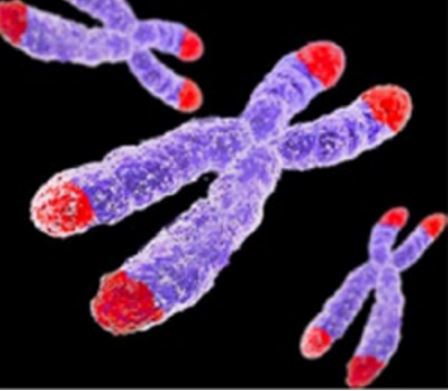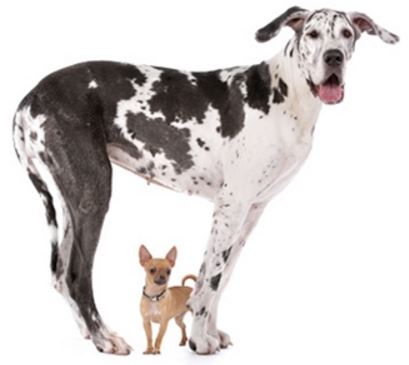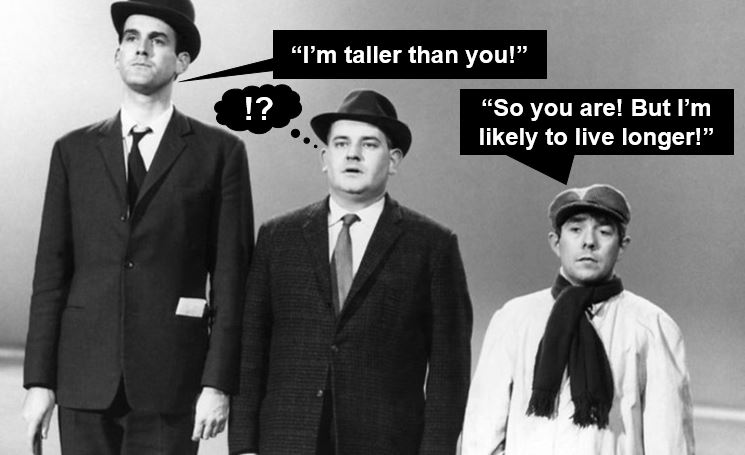Taller humans have shorter lifespans than shorter people because DNA that is linked to ageing and lifespan changes as body size gets bigger, say scientists from the University of Glasgow in Scotland and the Norwegian University of Science and Technology, who based their findings on wild house sparrows.
Professor Pat Monaghan, Regius Chair of Zoology at the University of Glasgow, and colleagues published their research in the academic journal Proceedings of the Royal Society Biological Sciences.
Although larger animal types tend to have longer lifespans than smaller ones – an elephant lives much longer than a mouse or a rabbit – within several species the larger individuals tend to die earlier than their smaller counterparts.
 Telomeres (red) are structures located at the ends of chromosomes (blue) that protect genetic material from deterioration during cell division. Telomeres stop chromosomes from binding with other chromosomes, fusing with themselves, and ‘fraying’. (Image: telomeretesting.net)
Telomeres (red) are structures located at the ends of chromosomes (blue) that protect genetic material from deterioration during cell division. Telomeres stop chromosomes from binding with other chromosomes, fusing with themselves, and ‘fraying’. (Image: telomeretesting.net)
For example, a Jack Russell has a considerably longer average lifespan than a St. Bernard.
Taller people more prone to disease
The same applies to human beings, the authors explained. There is a higher incidence of diseases including cancer among taller people. Until this study, scientists had not been able to fully explain the reason for this.
The answer may be in the telomeres. A telomere is a region of repetitive DNA at the ends of a chromosome – they protect the end of the chromosome from deterioration, a bit like the protective caps at the end of shoelaces.
In this study, the scientists focused on a population of wild house sparrows on the remote island of Leka, Norway.
The researchers found that house sparrows with bigger skeletons had shorter telomeres than their smaller counterparts.
 A Great Dane is unlikely to live more than 8 years, while a Chihuahua has a lifespan of at least 14 years. (Image: Buzzle Chihuahua Facts)
A Great Dane is unlikely to live more than 8 years, while a Chihuahua has a lifespan of at least 14 years. (Image: Buzzle Chihuahua Facts)
This association was maintained during a period when a selective breeding programme in Leka resulted in the sparrows becoming even bigger. The bigger the sparrows the shorter their telomeres were, the authors wrote.
Shorter telomeres linked to faster ageing and more diseases
The telomeres of all animals, including humans, erode over time. Telomere shortening has been linked to disease risk, including cancer, and ageing.
If you have naturally longer telomeres, you are probably at an advantage when it comes to the biological ageing process and overall risk of disease, compared to other humans with shorter telomeres.
 Shorter humans tend to have longer lifespans than their taller counterparts. (Image: BBC)
Shorter humans tend to have longer lifespans than their taller counterparts. (Image: BBC)
The results may help explain a paradox that has baffled biologists for a long time. If being larger gives an animal a competitive advantage – size protects from predators and makes it easier to catch prey – why don’t we all just get bigger and bigger?
Part of the answer is that getting bigger may mean more telomere loss and faster ageing, i.e. a shorter lifespan.
Professor Monaghan, who supervised the telomere analysis, explained:
“Growing a bigger body means that cells have to divide more. As a result, telomeres become eroded faster and cells and tissues function less well as a result.”
“The reason why the bigger individuals have shorter telomeres might also be related to increased DNA damage due to growing faster. Being big can have advantages, of course, but this study shows that it can also have costs.”
Thor Harald Ringsby, associate professor in population ecology at the Norwegian University of Science and Technology, who ran the fieldwork alongside his colleagues in Norway, said:
“The results from this study are very exciting and broad reaching. It is especially interesting that we obtained these results in a natural population. The reduction in telomere size that followed the increase in body size suggests one important mechanism that limits body size evolution in wild animal populations.”
The study was funded by the Research Council of Norway and the European Research Council.
Citation: “On being the right size: increased body size is associated with reduced telomere length under natural conditions,” Thor Harald Ringsby, Henrik Jensen, Henrik Pärn, Thomas Kvalnes, Winnie Boner, Robert Gillespie, Håkon Holand, Ingerid Julie Hagen, Bernt Rønning, Bernt-Erik Sæther, Pat Monaghan. Proceedings of the Royal Society Biological Sciences. Published 2 December 2015. DOI: 10.1098/rspb.2015.2331.
